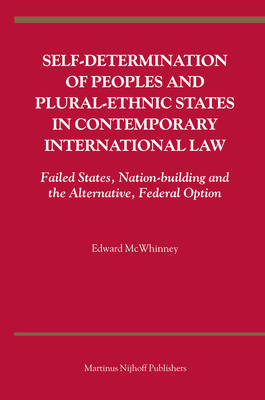
- Retrait gratuit dans votre magasin Club
- 7.000.000 titres dans notre catalogue
- Payer en toute sécurité
- Toujours un magasin près de chez vous
- Retrait gratuit dans votre magasin Club
- 7.000.0000 titres dans notre catalogue
- Payer en toute sécurité
- Toujours un magasin près de chez vous
Self-Determination of Peoples and Plural-Ethnic States in Contemporary International Law
Failed States, Nation-Building and the Alternative, Federal Option
Edward McWhinney
Livre relié | Anglais
95,98 €
+ 191 points
Description
In analysing the contemporary International Law principles as to Self-determination of Peoples, Dr. Edward McWhinney gives a special attention to the crisis today of multinational states put together, usually hurriedly and without proper regard for foreseeable later problems in establishing a plural-constitutional order system, by the military victors in World War I in the imposed Peace treaties of 1919. The key to successful exercise of a claimed right to self-determination is Recognition by other, existing states in the World Community and today also admission to the United Nations. In examining the classical rules on Recognition of States and the recent developed practice as to U.N. Membership, the author signals the continuing antinomy of Law and Power and how high political concerns for their own conceived national interests influence or control decisions on application of the legal ground rules in concrete cases by heads of government and their foreign ministries. The author notes at the same time the attempt to consolidate and codify existing rules on a political "regional" basis, most evident perhaps with the European Union today. In addressing the claimed new legal category of "failed state" with the concomitant asserted legal right of other states to intervene, if necessary unilaterally or outside the United Nations, to impose their own "corrective" measures, he suggests that the postulated "failure" in such cases may frequently stem less from problems inherent in the state concerned than from past hegemonial actions by outside states in pursuit of their own geopolitical interests in the region. A special concluding chapter draws on the empirical record of the historical, often trial-and-error experience of the Succession states to the Versailles treaties settlements and to the assorted acts of Decolonisation of the former European Imperial, Colonial powers.
Spécifications
Parties prenantes
- Auteur(s) :
- Editeur:
Contenu
- Nombre de pages :
- 148
- Langue:
- Anglais
Caractéristiques
- EAN:
- 9789004158351
- Date de parution :
- 30-09-07
- Format:
- Livre relié
- Format numérique:
- Genaaid
- Dimensions :
- 165 mm x 244 mm
- Poids :
- 544 g

Les avis
Nous publions uniquement les avis qui respectent les conditions requises. Consultez nos conditions pour les avis.






